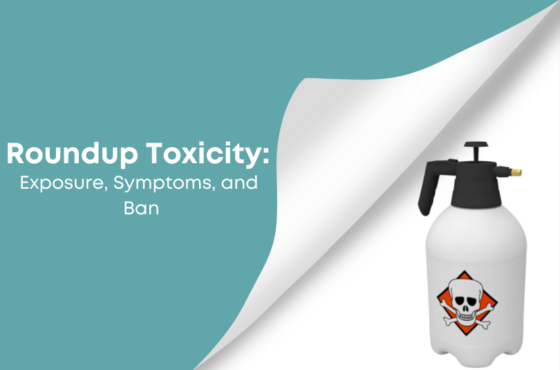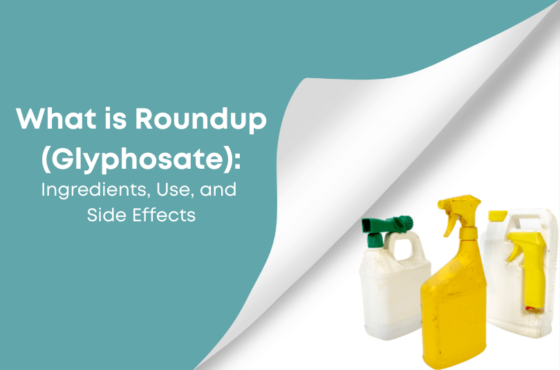Glyphosate is the active ingredient in the weed killer Roundup. Since its first use in 1974, it has grown to become the most widely used herbicide in the United States. That’s why it comes with little surprise that Roundup has been the subject of several studies regarding its potential to cause cancer.
However, aside from being the topic of debates among scientific experts about whether it is carcinogenic, glyphosate has also been the target of legal claims for the same reason. Plaintiffs who have filed a Roundup lawsuit claim that the weed killer is to blame for their non-Hodgkin lymphoma diagnosis.
What’s worse is that evidence exists that the toxic chemical may be hard to avoid because its traces have been found in urine samples and even certain foods. Read on to learn more about the link between Roundup exposure and an increased risk of developing certain cancers.
What kind of cancer does Roundup cause?
Roundup use increases the risk of developing a form of cancer called non-Hodgkin lymphoma (NHL) or cancer of the lymphatic system, which is a part of the body’s immune system. In a 2019 study conducted by the University of Washington researchers, they found that using glyphosate ups the risk of developing non-Hodgkin lymphoma by up to 41%.
The study authors concluded that there was a “compelling link” between exposures to glyphosate-based weed killers and an increased risk of NHL.
Furthermore, the International Agency for Research on Cancer (IARC), a part of the World Health Organization (WHO) stated in 2015 that glyphosate is a probable human carcinogen. And although the most serious allegations against Roundup have linked the herbicide to NHL, a growing body of evidence also links the chemical to other health concerns, including endocrine disruption, liver disease, reproductive concerns, and kidney disease, among others.
What are the symptoms of Roundup cancer?
Several plaintiffs have sued the manufacturers of Roundup, claiming that the weed killer caused their non-Hodgkin lymphoma. The symptoms of Roundup cancer are listed below.
- Swollen lymph nodes in the neck, underarms, or groin
- Swollen abdomen
- Chills
- Fever
- Fatigue
- Chest pain, coughing, or trouble breathing
- Night sweats
- Unexplained weight loss
Seek immediate medical attention if you are having the above listed symptoms and you think exposure to Roundup weed killer may have caused it. Your Roundup cancer lawyer may help you obtain medical records and proof that you have worked closely with the chemical for years.
What do scientific and regulatory agencies say about glyphosate and cancer?
According to the U.S. Environmental Protection Agency (EPA), there’s “no evidence that glyphosate causes cancer in humans.” The EPA further adds that there is no indication that glyphosate has adverse effects on the endocrine or reproductive system, or that its use increases one’s cancer risk. The European Food Safety Authority agrees with this statement.
However, this is incompatible with what the World Health Organization’s very own specialized cancer agency stated when it classified glyphosate as a potential cause of cancer in humans after reviewing years of peer-reviewed and published scientific studies.
Other organizations have also stepped up against Roundup use. For instance, the International Federation of Gynecology and Obstetrics has issued a statement advocating for the removal of glyphosate from global usage due to its potential cancer risk and several other human health concerns it can cause.
Additionally, in 2017, the California Environmental Protection Agency’s Office of Environmental Health Hazard Assessment said it would add glyphosate to California’s Proposition 65 list of chemicals that could potentially cause cancer. Roundup manufacturer Monsanto sued to block this action but the case was dismissed. Since then, herbicide manufacturers have stood by their products and their safety while also agreeing to settlements of lawsuits that have dogged them for years.
Which manufacturers are being sued?
The original producer of Roundup is Monsanto, which was acquired by Bayer in 2018. Since the company has bought the original Roundup manufacturer, it has already paid billions to settle tens of thousands of cases that claim the herbicide is carcinogenic and harmful to human health.
Plaintiffs also claim that Monsanto has long been aware that independent scientific studies had found that their blockbuster weed killer was probably carcinogenic, but it did nothing to warn the public about its risks. In fact, the company even tried to bury these findings.
In 2020, Bayer has already set aside more than $10 billion to resolve the majority of current and future Roundup cancer lawsuits. But even then, the chemical maker still faces over 30,000 lawsuits over the product as of writing.
In fact, the Supreme Court has very recently rejected Bayer’s appeal to dismiss thousands of lawsuits against its popular Roundup weedkiller products. Despite all these, however, the company maintains its stance that the product is safe, but said that it would replace glyphosate in Roundup for residential use starting 2023. Products with glyphosate will still be available for farm and professional use.
What chemicals in Roundup may cause cancer?
Glyphosate, a synthetic compound, is the primary ingredient of Roundup that causes cancer. It is a non-selective herbicide, which means that it kills just about any plant it comes into contact with and not just weeds. Glyphosate inhibits the passage of an enzyme that is important for plant growth. As a result, the plant dies.
However, glyphosate as a Roundup ingredient is rarely used on its own. It is often a part of a formulation that is composed of several other chemicals. According to scientists, this chemical cocktail contained in Roundup is what makes the product even more toxic and dangerous than just glyphosate on its own.
A Roundup Lawyer Can Fight For Your Right to Compensation
Years of research have already unearthed too much evidence on the connection between glyphosate and cancer for Bayer/Monsanto to not have been aware of the dangers of using Roundup weedkiller. As a manufacturer, the corporate giant has a legal responsibility to warn consumers about the risks associated with their product. This way, users can make informed decisions about whether or not and how to safely use the herbicide.
But Monsanto did none of these. Instead, it concealed Roundup’s dangers and marketed the product as being “safer than table salt” and “practically nontoxic.” For these unethical actions, if you have been subsequently diagnosed with non-Hodgkin lymphoma or other forms of cancer following glyphosate exposure, you may have a case against its manufacturer and the right to seek financial compensation to help with your medical bills.
But above all, this legal battle is a fight for justice for everyone who has been deliberately wronged by large corporations. Standing up against these abusive companies will also prevent them from victimizing thousands more Americans for the sake of profit.
The Roundup lawyers here at Drugwatcher are fully aware that Roundup victims have already suffered enough and should not have to worry anymore about the overwhelming legal work so they can focus instead on getting better.
Do not hesitate to contact us today and we will put you in touch with the right attorney who will work to obtain the best possible outcome for you and your Roundup lawsuit.



